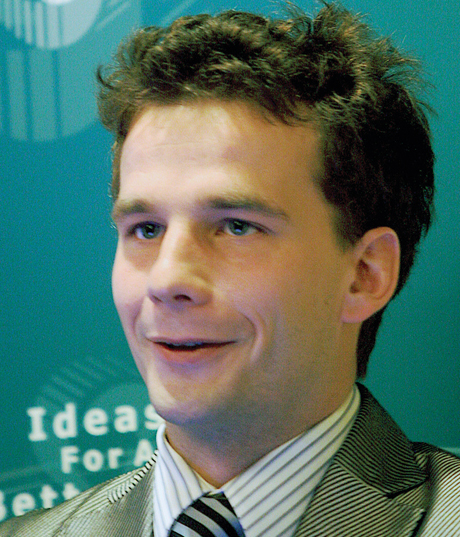An 8 minute TED Video on water markets.
David Seymour
David Seymour directed the Frontier Centre’s Saskatchewan office from 2007 to 2011. He holds degrees in Electrical Engineering and Philosophy from the University of Auckland, where he also tutored Economics. After working as an engineer in New Zealand, he applied his passion for sound policy analysis to policy issues on the Prairies. In four years working for the Frontier Centre, David carried out extensive media work, presenting policy analysis through local and national television, newspapers, and radio. His policy columns were published in newspapers in every province as well as the Globe and Mail and the National Post. David produced policy research papers on telecommunications privatization, education, environmental policy, fiscal policy, poverty, and taxi deregulation. However, his major project with the Frontier Centre was the annual Local Government Performance Index (LGPI) which compiled financial performance statistics across all major Canadian cities. David also produced an 18 part video series based on Henry Hazlitt’s classic book Economics in One Lesson and wrote the book “Birth of a Boom – Saskatchewan’s Dawning Golden Age” in 2011.
Research by David Seymour
Farmer Knows the Land
A Saskatchewan Farmer writes about the role of wetlands on sask farm land over the last century, as a sink and a source of water in wet and dry years. With the advent of larger equipment, farmers of that time did a more complete job of land development. When you read...
Florida’s Interior Design Regulations (yes, really).
Interior decorating regulations show the U.S. is not THAT free.
The Economist on Taming Leviathan
An Economist Special Report touched on some Frontier themes.
Featured News
Our Health Ministers Need to Take a Lesson from Hockey Coaches
Those of you who are tired of my rants about the demise of our once great health system will be pleased to know that this is my last editorial. I am retiring from the BCMJ Editorial Board; currently, I am the longest-serving member (more than 20 years). I have been a...
Zinchuk: Oilpatch Only Spending Half What It Spent in 2014
Back in the lofty, pre-Justin Trudeau government days of 2014, back when oil was booming, pipelines were planned to east and west coasts, and Alberta and Saskatchewan were swimming in money, around $81 billion was spent in capital expenditures (CAPEX) in the Canadian...
Liquor Privatisation and Cost/Convenience Trade Offs
Several weeks ago the Saskatoon Star Phoenix ran a piece from a U of S professor named Colin Boyd.
Boyd claims that Alberta liquor is NOT cheaper than Saskatchewan liquor. We point out that this 2009 Frontier study found that it is.
Whoever is right about that, there is a more important point that Boyd misses in his article. The price at the checkout is not the full cost of the item. The full cost is the cost of getting the item to your house. Part of this cost is paid at the checkout, and part of it is paid by the customer in the course of getting to the store and then home again. These costs are not only time and travel costs, but also stress and inconvenience. In his article, Boyd implies that having multiple stores in what seems to be a small area is an unnecessary duplication that increases the cost of liquor. Therefore, he concludes, Saskatchewan has the superior system.
Calgary’s Taxis: With the Right Expectations, Everybody can be Happy: Calgary’s taxi system is out of step with trends in the wider world beyond it.
Any honest assessment of Calgary’s taxi market would have asked why a tiny minority of plate holders are able to earn monopoly rents of hundreds of thousands of dollars per week. A recent report which acknowledged but evaded this question showed just how powerful are the vested interests in Calgary’s taxi industry.
Oil Sands vs. Wind Turbines: A bird’s perspective
Frontier’s new video on the oil sands versus wind turbines from a bird’s perspective.
Workers of the World, You’re Each for Yourself
Raising Potash royalties amounts to selfishness by an arbitrary group of people.
“Fair?”
Is penny pinching resource royalties the ultimate in entitlement mentality, and where does it lead us?
Saskatchewan Tops Population Growth
Saskatchewan’s leading population growth is a reflection of the previous and present governments creating a safe policy environment.
Unaffordable Housing is a Long Term Fiscal Liability
Why overpriced housing will become a liability as the workforce shrinks.
From the “you can’t make this sh*t up” file.
A Laval school excludes a 6 year old boy from a contest to win a teddy bear because his lunch bag doesn’t fit their version of sustainability. He goes home crying.
When Housing Affordability, Demographics and Tax Bills Collide: Expensive housing assets won’t be much good if they drive away future tax payers.
Unaffordable housing, demographic shifts, and internal migration may be setting up a perfect storm for some parts of Canada over the coming decades. If young workers are repelled from a jurisdiction by unaffordable housing they won’t be around to pay taxes, or buy housing either.
